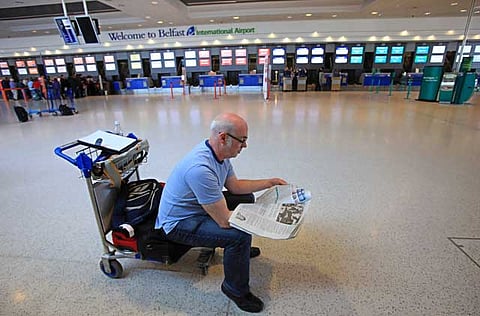SITA and IATA: Airline passengers will soon be taking their COVID-19 travel pass
These allow fliers to input their health and vaccine details to speed up travel procedure

Dubai: In the near future, anyone booking an airline ticket may have to rely on SITA or IATA.
These are aviation industry affiliated entities that will soon come out with digital platforms, which will carry details on the passenger’s COVID-19-related health status. What SITA and IATA initiatives aim to do is speed up delivery of such vital information and thus inject confidence in air travel among fliers, airlines and governments.
“Before you leave, you have to submit the health declaration and give information like where you've been in the last 14 days and whether you have been in close proximity to someone who tested positive,” said Emad Muhanna, Vice-President, Government Sector - Middle East, India and Africa (MEIA) at SITA, which is more known as a provider of vital tech solutions for airlines.
SITA’s ‘Health Protect’ is still in its trial phase and, according to one of the key executives, it is vastly different from IATA’s earlier announced ‘Travel Pass’ programme.
Degrees of difference
IATA’s Travel Pass is a digital health passport that lets passengers interact with airlines well before they arrive for boarding. “In a way, instead of submitting a piece of paper, you submit a barcode,” said Muhanna. “Then the airline can verify that you've actually done the test,” said Muhanna.
On the other hand, the Health Protect can integrate with multiple passport schemes like IATA Travel Pass or travel apps like SimplyGo. Once a passenger creates a record, it is sent directly to the airlines.
Muhanna added that unlike the Travel Pass - where the passenger information is first stored on the app - Health Protect will submit the records directly from the test center to the airline and then to the government.
Connectivity
The Health Protect programme is not about going it alone… or competing with other offerings. “We are open to work with the various schemes that are out there,” said Muhanna.
SITA plans to work closely with IATA and SimplyGo. “There are two other passport schemes that we are in contact with – our view is that there will be multiple schemes and our role is really to complement, not to compete,” the official added.
It can integrate with multiple travel pass or ‘health passport’ schemes. Also, by incorporating 'Advance Passenger Processing', it enables authorities to make an informed decision whether a passenger can travel at the point of check-in, thus improving the safety aspect and avoiding costly return flights.
Getting the health check
SITA’s Health Protect was recently trialed with SimplyGo, one of several health passport schemes. A group of travellers from Germany and Estonia to the UAE tested the platform and SimplyGo in a live environment. During the trial, travellers obtained a negative COVID-19 result via their SimplyGo app before the trip. The data was stored on the SimplyGo platform to be accessed by airlines and border officials authorizing the boarding. The platform’s interface enables passengers to submit the necessary declarations before a trip.
Gain traction
“There's a lot of interest from governments, (they) really want to open up and want to find a way that allows them to open up,” said Muhanna. “But there is hesitation regarding sharing information, standardization and so on.
“There needs to be an agreement among countries - having standards and having agreement among governments to adopt them is key for us to be able to (implement) these schemes needed to help the industry.”
Sign up for the Daily Briefing
Get the latest news and updates straight to your inbox







